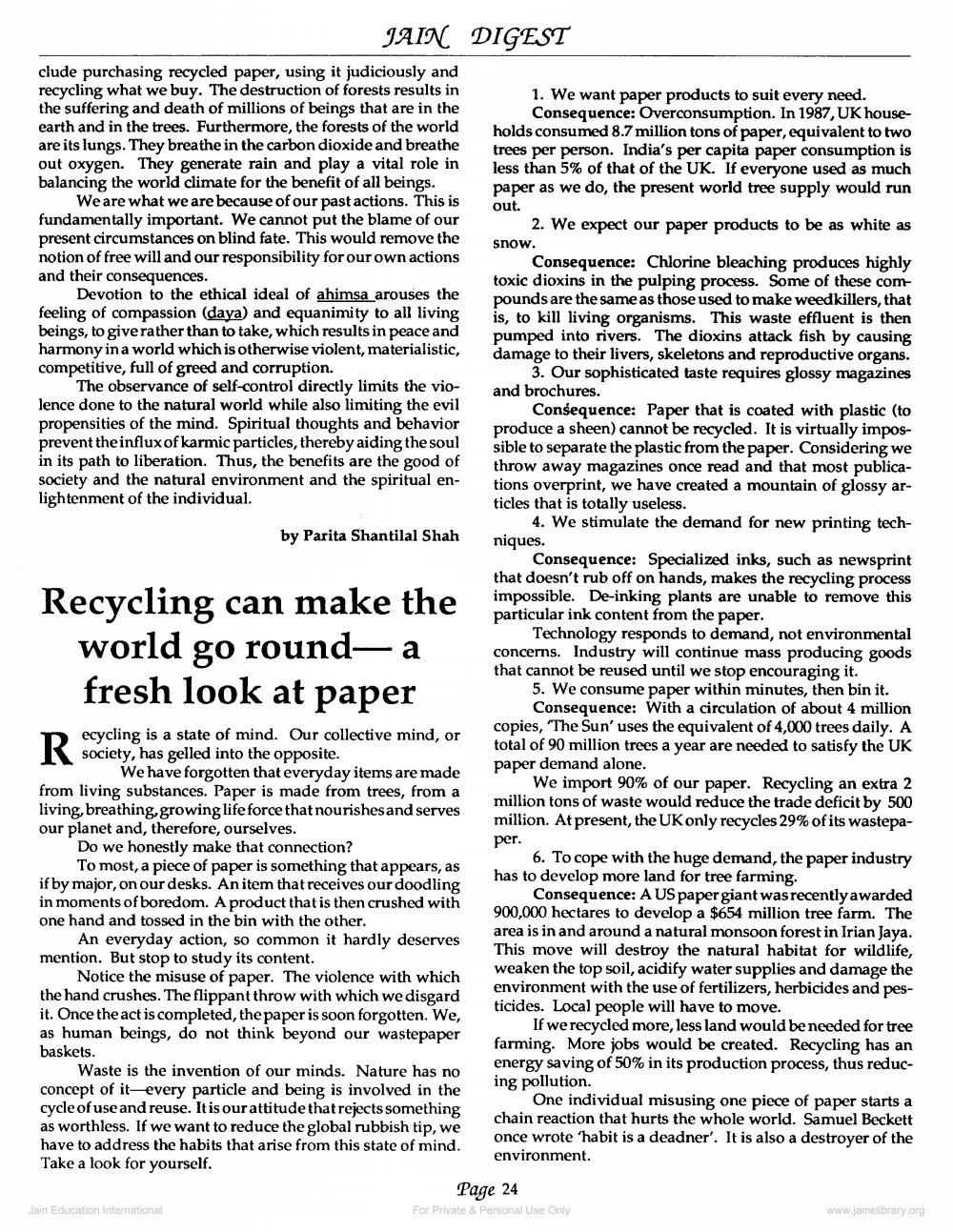________________
JAIN DIGEST
clude purchasing recycled paper, using it judiciously and recycling what we buy. The destruction of forests results in
1. We want paper products to suit every need. the suffering and death of millions of beings that are in the
Consequence: Overconsumption. In 1987, UK houseearth and in the trees. Furthermore, the forests of the world
holds consumed 8.7 million tons of paper, equivalent to two are its lungs. They breathe in the carbon dioxide and breathe
trees per person. India's per capita paper consumption is out oxygen. They generate rain and play a vital role in less than 5% of that of the UK. If everyone used as much balancing the world climate for the benefit of all beings.
paper as we do, the present world tree supply would run We are what we are because of our past actions. This is
out. fundamentally important. We cannot put the blame of our
2. We expect our paper products to be as white as present circumstances on blind fate. This would remove the
snow. notion of free will and our responsibility for our own actions Consequence: Chlorine bleaching produces highly and their consequences.
toxic dioxins in the pulping process. Some of these comDevotion to the ethical ideal of ahimsa arouses the
pounds are the same as those used to make weedkillers, that feeling of compassion (daya) and equanimity to all living
is, to kill living organisms. This waste effluent is then beings, to give rather than to take, which results in peace and
pumped into rivers. The dioxins attack fish by causing harmony in a world which is otherwise violent, materialistic,
damage to their livers, skeletons and reproductive organs. competitive, full of greed and corruption.
3. Our sophisticated taste requires glossy magazines The observance of self-control directly limits the vio
and brochures. lence done to the natural world while also limiting the evil
Consequence: Paper that is coated with plastic (to propensities of the mind. Spiritual thoughts and behavior
produce a sheen) cannot be recycled. It is virtually imposprevent the influx of karmic particles, thereby aiding the soul
sible to separate the plastic from the paper. Considering we in its path to liberation. Thus, the benefits are the good of
throw away magazines once read and that most publicasociety and the natural environment and the spiritual en
tions overprint, we have created a mountain of glossy arlightenment of the individual.
ticles that is totally useless.
4. We stimulate the demand for new printing techby Parita Shantilal Shah
niques.
Consequence: Specialized inks, such as newsprint that doesn't rub off on hands, makes the recycling process impossible. De-inking plants are unable to remove this particular ink content from the paper.
Technology responds to demand, not environmental concerns. Industry will continue mass producing goods that cannot be reused until we stop encouraging it.
5. We consume paper within minutes, then bin it.
Consequence: With a circulation of about 4 million
copies, 'The Sun' uses the equivalent of 4,000 trees daily. A ecycling is a state of mind. Our collective mind, or
total of 90 million trees a year are needed to satisfy the UK society, has gelled into the opposite.
paper demand alone. We have forgotten that everyday items are made from living substances. Paper is made from trees, from a
We import 90% of our paper. Recycling an extra 2 living, breathing, growing life force that nourishes and serves
million tons of waste would reduce the trade deficit by 500
million. At present, the UK only recycles 29% of its wastepaour planet and, therefore, ourselves. Do we honestly make that connection?
per.
6. To cope with the huge demand, the paper industry To most, a piece of paper is something that appears, as
has to develop more land for tree farming. if by major, on our desks. An item that receives our doodling in moments of boredom. A product that is then crushed with
Consequence: A US paper giant was recently awarded
900,000 hectares to develop a $654 million tree farm. The one hand and tossed in the bin with the other.
area is in and around a natural monsoon forest in Irian Jaya. An everyday action, so common it hardly deserves
This move will destroy the natural habitat for wildlife, mention. But stop to study its content. Notice the misuse of paper. The violence with which
weaken the top soil, acidify water supplies and damage the
environment with the use of fertilizers, herbicides and pesthe hand crushes. The flippant throw with which we disgard it. Once the act is completed, the paper is soon forgotten. We,
ticides. Local people will have to move.
If we recycled more, less land would be needed for tree as human beings, do not think beyond our wastepaper
farming. More jobs would be created. Recycling has an Waste is the invention of our minds. Nature has no
energy saving of 50% in its production process, thus reducconcept of it-every particle and being is involved in the
ing pollution.
One individual misusing one piece of paper starts a cycle of use and reuse. It is our attitude that rejects something
chain reaction that hurts the whole world. Samuel Beckett as worthless. If we want to reduce the global rubbish tip, we have to address the habits that arise from this state of mind.
once wrote 'habit is a deadner'. It is also a destroyer of the Take a look for yourself.
environment.
Page 24 Jain Education Intemational For Private & Personal Use Only
www.jainelibrary.org
Recycling can make the world go round- a fresh look at paper
baskets.




